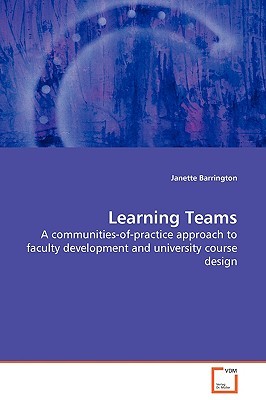
- We will send in 10–14 business days.
- Author: Janette Barrington
- Publisher: VDM Verlag
- ISBN-10: 3639103874
- ISBN-13: 9783639103878
- Format: 15.2 x 22.9 x 0.9 cm, softcover
- Language: English
- SAVE -10% with code: EXTRA
Learning Teams - A communities-of-practice approach to faculty development and university course design (e-book) (used book) | bookbook.eu
Reviews
Description
We have intuitive knowledge that more heads are better than one in instructional decision-making, now we have empirical evidence. The traditional model of faculty development is workshops and one-on-one consultations. Situated learning theory suggests we move out of the classroom and into authentic, collaborative, problem-based work situations. This is what learning teams do. Learning teams emphasize collective responsibility for student learning. Teams are composed so that professors deliberate on course decisions with a strategic group of people - crossing boundaries we may not even know exist. They represent a proactive model for faculty development with course design as a vehicle for change. This book tells the story of a learning team that met for one year, generating and reflecting on the results of three design iterations. Grounded theory analysis of interviews with participants generated a conceptual model with a core concept captured in the phrase "a systematic way of talking to each other." Learning teams will be of interest to university administrators, faculty, staff, and graduate students interested in new ways of working together to improve student learning.
EXTRA 10 % discount with code: EXTRA
The promotion ends in 18d.22:15:05
The discount code is valid when purchasing from 10 €. Discounts do not stack.
- Author: Janette Barrington
- Publisher: VDM Verlag
- ISBN-10: 3639103874
- ISBN-13: 9783639103878
- Format: 15.2 x 22.9 x 0.9 cm, softcover
- Language: English English
We have intuitive knowledge that more heads are better than one in instructional decision-making, now we have empirical evidence. The traditional model of faculty development is workshops and one-on-one consultations. Situated learning theory suggests we move out of the classroom and into authentic, collaborative, problem-based work situations. This is what learning teams do. Learning teams emphasize collective responsibility for student learning. Teams are composed so that professors deliberate on course decisions with a strategic group of people - crossing boundaries we may not even know exist. They represent a proactive model for faculty development with course design as a vehicle for change. This book tells the story of a learning team that met for one year, generating and reflecting on the results of three design iterations. Grounded theory analysis of interviews with participants generated a conceptual model with a core concept captured in the phrase "a systematic way of talking to each other." Learning teams will be of interest to university administrators, faculty, staff, and graduate students interested in new ways of working together to improve student learning.


Reviews